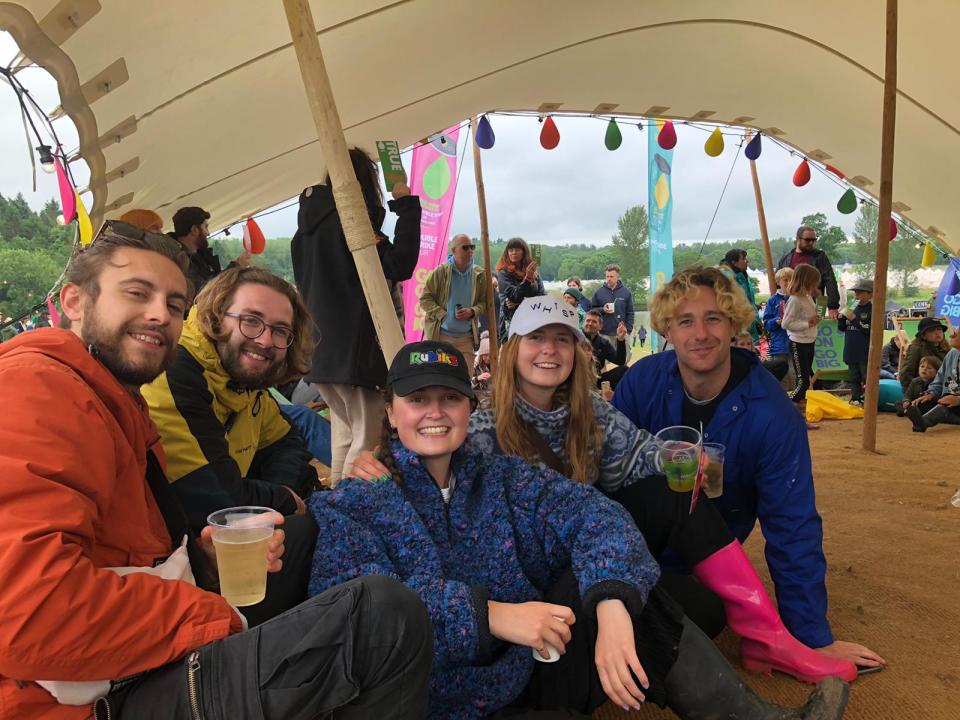Hay bales and cocktail makers in wellies: what it’s like to go to a music festival during the pandemic

“They were just so determined to make this happen, no matter what,” explained a staffer as I bowled past security, catching sight of the first festival stages I’ve seen in nearly two years.
Near the main stage was a pretty lake and on some hay bales, cocktail makers in wellies shook drinks for punters. Soundbites from bands and excitable audiences carried in the wind.
This was Bigfoot festival and, alongside Download, it was one of the first music festivals to take place after a drought just shy of two years. It felt in jeopardy at every stage of the spring. Anxiety was so high that, four days before it happened, a friend insisted: “I won’t believe it until I see it. I just don’t see how.”
I’d been emailing, asking when the inevitable cancellation would come – but it never did. This IRL event in the Warwickshire countryside was actually happening, as tier 3 allows events with under four thousand people if they practice social distancing. They’re just a logistical nightmare, as the smaller crowd sizes make it harder for festival runners to make money. Added to this, with no government-backed insurance, organisers stand to lose millions if Boris Johnson pulls a last-minute lockdown U-turn days beforehand.
But it is essential that festivals find a safe, navigable path to continue. For someone like me, the spontaneity festivals encourage and their rich cultural intensity are vital. Festivals are my lifeblood, and so many others feel like me – that’s why events like these have existed for thousands of years. They’re an essential means of gathering people together to properly relax, with the camping option removing hassle about last trains.
They say a holiday will make or break a new couple, and in a similar way, festivals help nurture deeper connections. It’s easier to power past the small talk and get to the proper conversations when you’ve got three days with pals rather than a few hours at dinner. At festivals, punters practice the zeitgeisty thrill of being “present”. Stimulated by the racket of punk bands and elaborate harmonies of gospel choirs, we’re distracted from worrying about the mundane.
These days I have developed my own little community of festival acquaintances – people I don’t see outside of events but that I bump into in rainy fields every summer. I’ve also made some of my best friends in fields. They are my safe space, and they provide a temporary, utopian alternative to the local community I have at home.
But don’t just take my word for it: festivals have value which stretches way beyond the individual experience. Ideas form at festivals, and new music is discovered and fed into the ecosystem at music festivals, creating tomorrow’s next big bands. They are also hotbeds of experimentation in all sorts of other unexpected ways – they nurture new sustainable technology (urine turned to water, anyone?), and theatre tropes exploring fresh ways to do Shakespeare.
I’d like to thank Bigfoot festival for having the belief that they could pull this off, for providing a template for getting festivals back up and running and for giving me one of the first weekends that I have felt closer to my pre-pandemic self.
But there is a broader issue beyond me and my friends: sadly many festivals have been cancelled this year because they don’t have the financial backing to take Bigfoot’s sort of risk. Speaking about the financial crisis affecting festivals, the Association of Independent Festivals revealed that 93 per cent of remaining UK festivals “could still potentially go ahead this summer – but not without insurance”.
Just as with fringe theatres and grassroots music venues, it’s essential that the government steps in and offers support. Festivals aren’t just about the music – they’re essential lifelines for some of us to feel connected, and a place for fresh cultural ideas to emerge. It’s fundamental that they are protected.
Read More
The public is far from ready to ‘move on’ from the Brexit vote
We must never allow this government to divide us with their ‘culture wars’

 Yahoo Movies
Yahoo Movies 